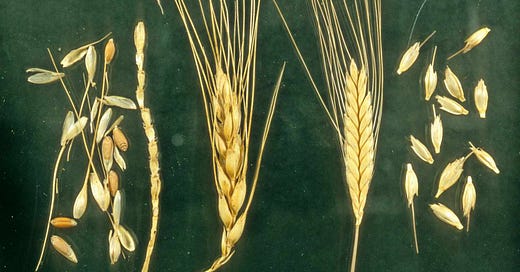ANCESTRAL EATING: GRAINS IV: Simple Einkorn Sourdough Loaf
This is as simple as sourdough loaves come, and the perfect way to make use of your starter
Welcome to another part in this multi-part examination of grain consumption. In the first part of this sub-series, I established three important points which serve as guiding principles for navigating the various issues associated with grain consumption:
Humans, or rather some humans, have a deep history of consuming grains, in wild form, that may stretch back at least 100,000 years.
The vast majority of people throughout history have probably consumed few if any grains in their diet.
You can display what Weston Price called “perfect health” by eating grains or by not eating grains.
My basic point about grains is that you can eat them to maintain perfect health, but you don’t have to. At the end of the day, I think it comes down to your individual preferences, including the availability of high-quality heirloom or “ancient” varieties of grain and your ability to process them in suitable ways to neutralise the anti-nutrients within them and minimise the negative effects of gluten if it is present, and your personal tolerance for grains and especially gluten-containing grains.
Some people just can’t eat any gluten at all, while others tolerate it well, even the more aggressive modern varities, without any obvious side effects. You’re only likely to discover your tolerance with experimentation, such as a period of eight or 12 weeks without gluten. Giving up gluten for a “trial period” convinced me that I needed to eliminate wheat from my diet; although I’ve since reintroduced homemade organic rye sourdough bread to my diet, with some success.
In the last instalment of this sub-series in ANCESTRAL EATING, I told you all about the benefits of fermentation. Now we’re going to put what we’ve learned, and the sourdough starter you’ve made (you have made it, haven’t you, anon?), to good use by baking what may be your first ever homemade sourdough loaf.
Before we go any further, let’s recap the benefits of fermentation, especially as it pertains to bread:
By reducing the gluten content, fermentation makes bread more digestible, allowing more of the protein to be absorbed and reducing the negative effects of gluten on body and mind. One strain of bacteria isolated from a batch of traditional sourdough bread made in Pakistan was shown to degrade just under 75% of gluten within a 24-hour period.
There are also other anti-nutrients present in wheat that the fermentation process helps to break down. Phytates bind to key minerals like magnesium and zinc, causing them to pass out of the body rather than being absorbed. This can cause serious deficiencies if it is not addressed. The use of unleavened bread (i.e. unfermented bread) in the Middle East is associated with regular epidemics of stunting due to zinc and magnesium deficiencies.
So we can already see that fermentation helps to make the substrate more nutritious, by allowing the body to absorb more macronutrients from it and reducing or even preventing the action of anti-nutrients. But the nutrition-enhancing effects of fermentation go much further than this. When bacteria feed on a substrate like wheat dough, they use enzymes to make all the substances they need to grow. That means amino acids, nucleic acids, fatty acids, vitamins and other compounds. All of these compounds then become available to us when we consume the substrate the bacteria have been hard at work fermenting. Foods that have been fermented are, as a rule, considerably more nutritious than than foods that haven’t.
Fermented foods also help to seed our digestive system with beneficial bacteria which act as an extension of our immune system and produce substances that have a variety of health-promoting benefits, improving mood and metabolism and even boosting our hormonal health, including testosterone production.
The loaf we’ll be making in the simple recipe that follows is an einkorn sourdough loaf. Einkorn is basically as close to ancient wheat as you can get. It has significantly less gluten and starch, and significantly more protein, than modern wheat varieties. Einkorn also has far higher levels of vital nutrients like zinc, copper, iron, magnesium and selenium.
Keep reading with a 7-day free trial
Subscribe to In the Raw to keep reading this post and get 7 days of free access to the full post archives.





